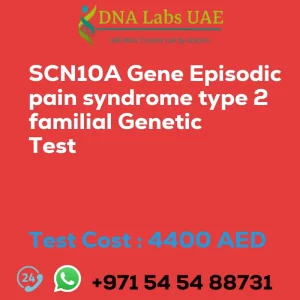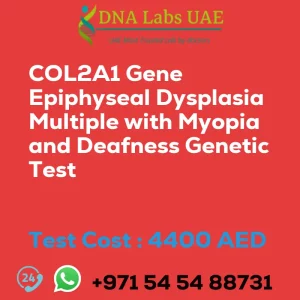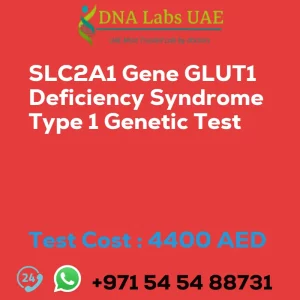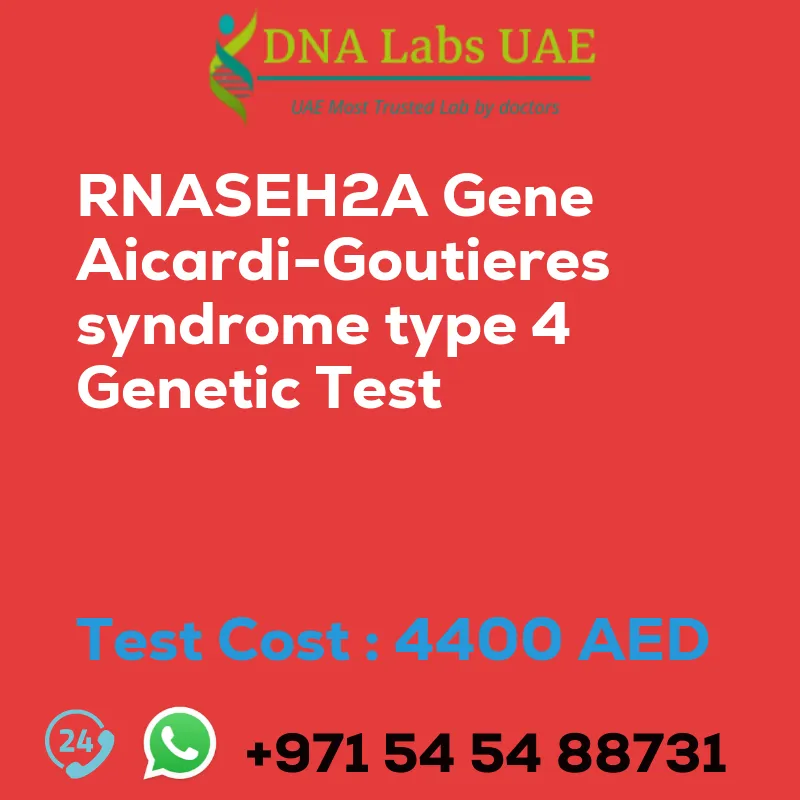
The RNASEH2A gene is associated with Aicardi-Goutieres syndrome type 4 (AGS4), a rare genetic disorder that typically presents in infancy with severe neurological symptoms, including developmental delay, spasticity, and encephalopathy. AGS mimics congenital viral infections and is characterized by an overactive immune response in the brain. The RNASEH2A gene plays a crucial role in DNA repair and the maintenance of genome stability. Mutations in this gene disrupt these processes, leading to the accumulation of DNA fragments in the cell, triggering an abnormal immune response.
A genetic test for the RNASEH2A gene can confirm a diagnosis of Aicardi-Goutieres syndrome type 4. This test is particularly useful for families with a history of the condition or when a child presents with symptoms suggestive of AGS4. The test involves analyzing the patient's DNA, extracted from a blood sample, for mutations in the RNASEH2A gene that are known to cause the disorder.
In the UAE, this specific genetic test is available at DNA Labs UAE, a leading provider of genetic testing and analysis services. The cost of the RNASEH2A gene test for Aicardi-Goutieres syndrome type 4 is 4400 AED. This comprehensive test not only aids in the diagnosis of AGS4 but also helps in the management and treatment planning for affected individuals. It can also provide valuable information for family planning to at-risk couples.
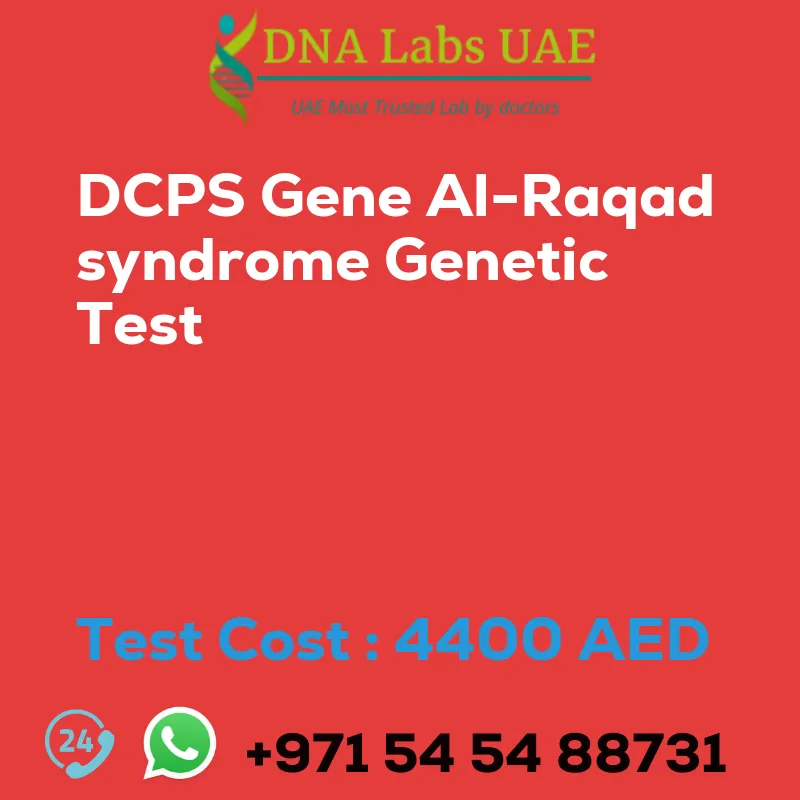
The DCPS Gene Al-Raqad Syndrome Genetic Test is a specialized diagnostic tool offered by DNA Labs UAE, designed to detect mutations in the DCPS gene, which are linked to the rare genetic disorder known as Al-Raqad syndrome. Al-Raqad syndrome is characterized by a range of symptoms, including developmental delays, intellectual disability, and skeletal abnormalities. Early detection through genetic testing is crucial for managing the condition and providing appropriate care and interventions.
DNA Labs UAE, a leading provider of genetic testing services, conducts this test with precision and care, ensuring reliable results for patients and their families. The test is priced at 4400 AED, reflecting the comprehensive analysis and detailed report provided. By identifying specific genetic mutations associated with Al-Raqad syndrome, the test enables healthcare professionals to make informed decisions about treatment options and supports families in understanding the condition better.
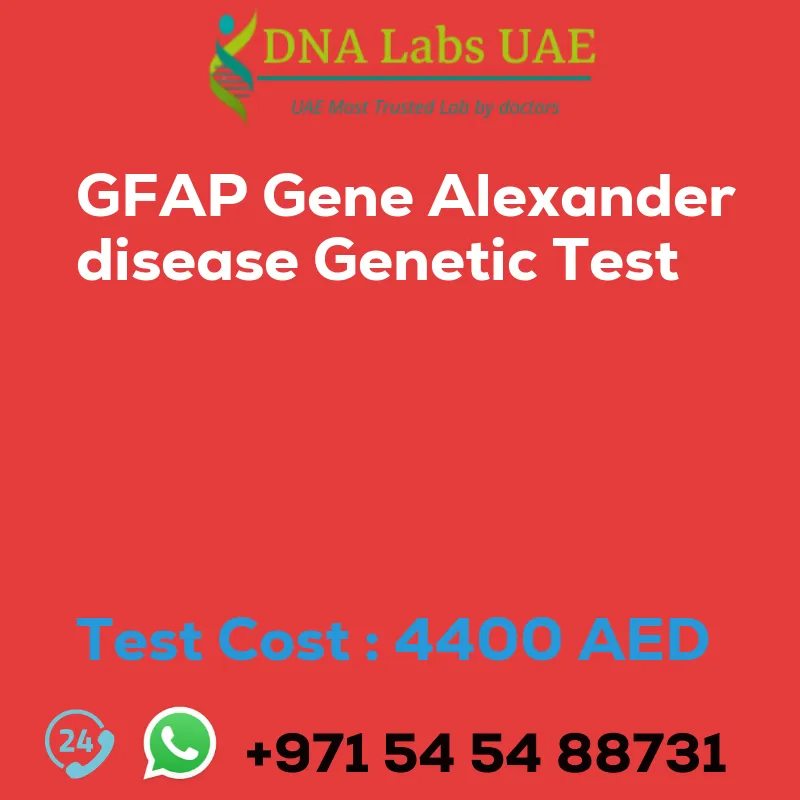
The GFAP gene Alexander disease genetic test is a specialized diagnostic tool used to identify mutations in the GFAP gene, which are indicative of Alexander disease. Alexander disease is a rare neurological disorder that affects the brain's white matter, leading to a wide range of neurological symptoms and physical disabilities. The GFAP gene encodes the glial fibrillary acidic protein, which is primarily found in astrocytes, a type of glial cell in the brain. Mutations in this gene disrupt the normal function of astrocytes, leading to the accumulation of Rosenthal fibers and the progressive deterioration of white matter.
The test is conducted through a blood sample, where DNA is extracted and analyzed for mutations in the GFAP gene. It is a crucial step for families with a history of Alexander disease or individuals showing symptoms, as early diagnosis can help in managing the disease more effectively, although there is currently no cure.
Conducted by DNA Labs UAE, the test costs 4400 AED. DNA Labs UAE is a reputable facility known for its advanced genetic testing services. They provide detailed analysis and interpretation of the results, ensuring that individuals and their healthcare providers have the necessary information for appropriate medical and supportive care planning.

The SLC16A2 gene test is a critical diagnostic tool for Allan-Herndon-Dudley syndrome (AHDS), a rare X-linked recessive disorder affecting neurological development and function. This genetic test focuses on identifying mutations in the SLC16A2 gene, which plays a significant role in thyroid hormone transport across the brain. Mutations in this gene can lead to the characteristic symptoms of AHDS, including intellectual disability, muscle weakness, and movement disorders.
DNA Labs UAE offers this specialized genetic test for individuals suspected of having AHDS. The test cost is set at 4400 AED. Conducting the test involves collecting a DNA sample, usually through a blood draw, which is then analyzed in the lab for any genetic anomalies in the SLC16A2 gene. The results from this test can provide essential information for the diagnosis, management, and understanding of the condition, allowing for tailored care and support for affected individuals and their families.
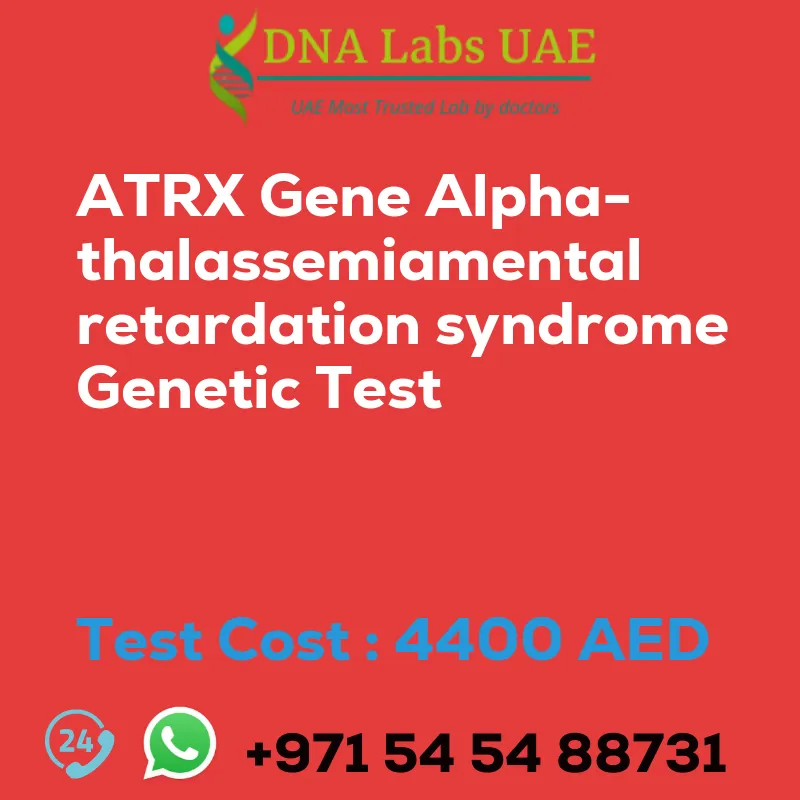
The ATRX Gene Alpha-thalassemia/mental retardation syndrome genetic test is a specialized diagnostic tool designed to identify mutations in the ATRX gene, which are linked to a rare condition known as Alpha-thalassemia/mental retardation syndrome (ATR-X). This syndrome is characterized by a combination of alpha-thalassemia, a blood disorder that reduces the production of hemoglobin, and intellectual disability, along with various other physical anomalies. The ATRX gene plays a crucial role in chromatin remodeling, which is essential for normal development, and mutations in this gene can lead to the diverse symptoms observed in affected individuals.
Conducted at DNA Labs UAE, a leading facility in genetic diagnostics, the test offers a comprehensive analysis of the ATRX gene to identify potential mutations. The cost of the test is 4400 AED, reflecting the intricate technology and expertise required to accurately diagnose this complex condition. By opting for this test, individuals at risk or families with a history of the syndrome can gain crucial insights into their genetic makeup, enabling informed decisions regarding management, treatment options, and genetic counseling. DNA Labs UAE ensures confidentiality and provides support through expert genetic counselors to help interpret the results and guide the next steps for affected individuals and their families.
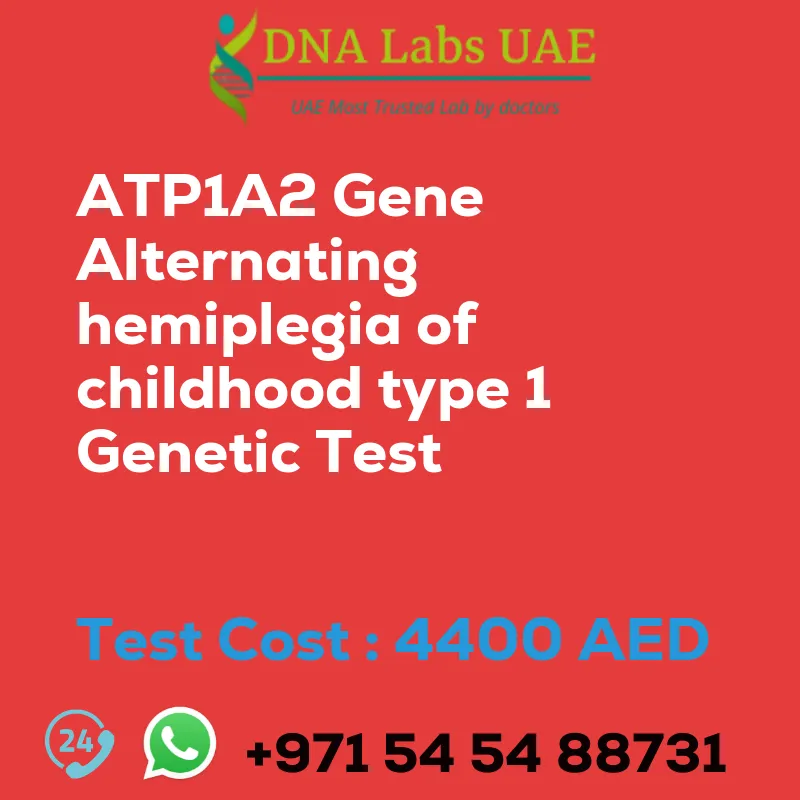
The ATP1A2 gene is associated with Alternating Hemiplegia of Childhood type 1 (AHC1), a rare neurological disorder characterized by recurrent episodes of hemiplegia (paralysis of one side of the body) that can alternate from one side to the other. Symptoms often manifest in infancy or early childhood and can include a wide range of other neurological issues, such as developmental delay, seizures, and abnormalities in movements. The ATP1A2 gene encodes an essential enzyme for maintaining the proper balance of sodium and potassium ions in nerve cells, crucial for normal brain function.
A genetic test for mutations in the ATP1A2 gene can confirm a diagnosis of Alternating Hemiplegia of Childhood type 1. This test is particularly valuable for affected individuals and their families for several reasons. Firstly, it provides a definitive diagnosis, helping to guide treatment and management strategies. Secondly, it offers information on the genetic basis of the condition, which can be useful for understanding the risk of recurrence in future pregnancies.
In the United Arab Emirates, DNA Labs UAE offers a genetic test for the ATP1A2 gene, catering to individuals who might be showing symptoms of AHC1 or have a family history of the disorder. The cost of the test is 4400 AED. The process involves collecting a DNA sample, typically through a blood draw or a cheek swab, which is then analyzed in the laboratory for mutations in the ATP1A2 gene. The results from this test can provide critical insights for families and healthcare providers, enabling informed decisions about care and support for individuals with AHC1.
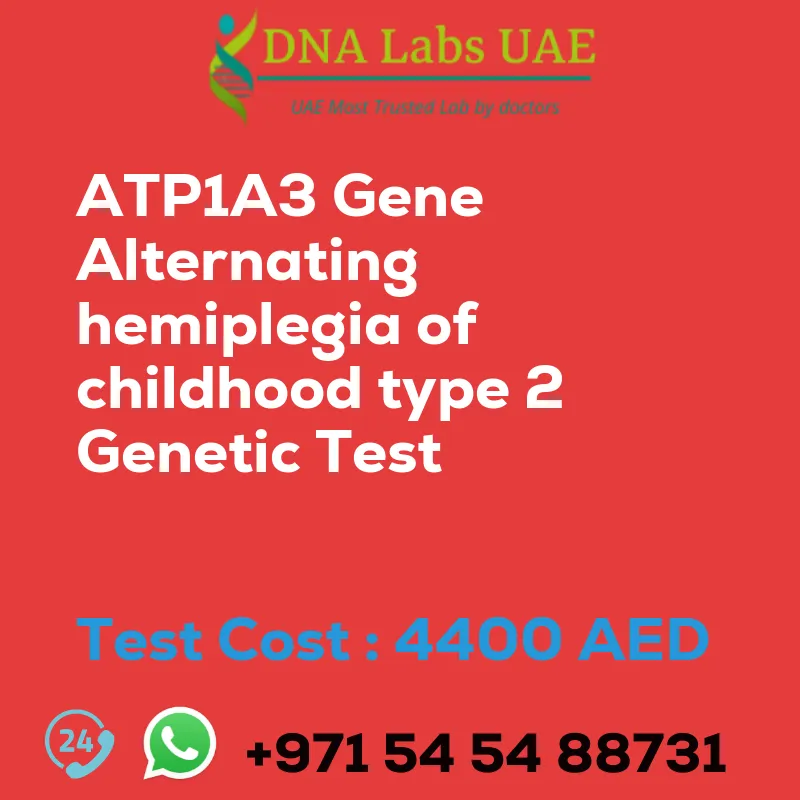
The ATP1A3 gene is implicated in a rare neurological disorder known as Alternating Hemiplegia of Childhood type 2 (AHC2). This condition is characterized by recurrent episodes of paralysis that affects either side of the body, dystonia, developmental delay, and seizures. The ATP1A3 gene encodes a subunit of the Na+/K+ ATPase pump, crucial for maintaining the electrochemical gradient across the cell membrane, which is essential for normal brain function.
DNA Labs UAE offers a specialized genetic test aimed at identifying mutations in the ATP1A3 gene, which can confirm a diagnosis of AHC2. This test is particularly important for families seeking a definitive diagnosis and for guiding treatment plans. The cost of the test is 4400 AED. Early diagnosis through genetic testing can lead to better management of the symptoms and improve the quality of life for individuals affected by this condition.
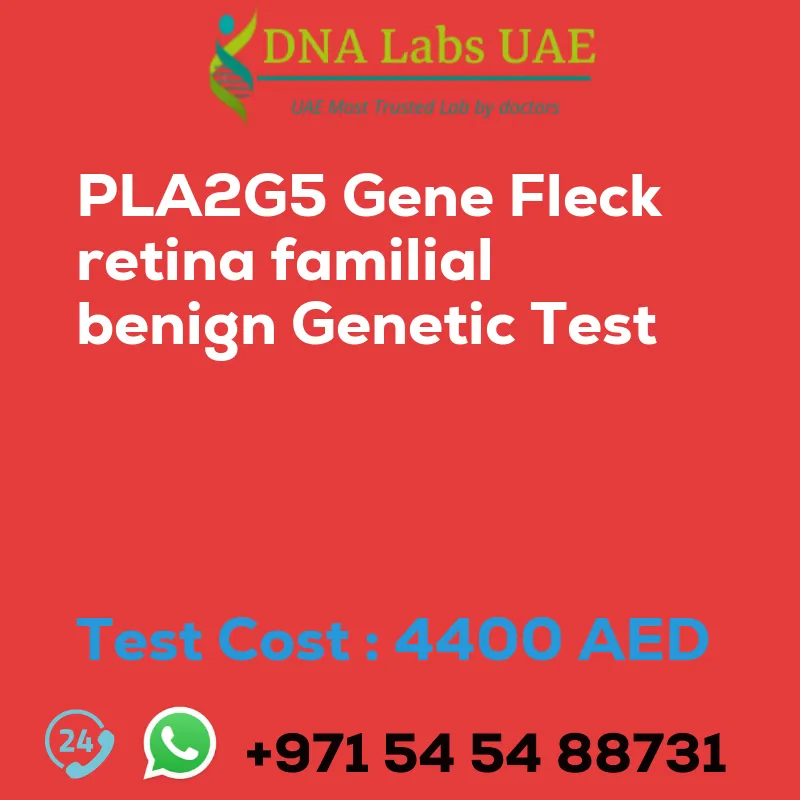
The "PLA2G5 Gene Fleck Retina Familial Benign Genetic Test" is a specialized diagnostic assessment available at DNA Labs UAE, designed to identify mutations in the PLA2G5 gene. This gene is associated with a rare, non-progressive retinal condition known as Fleck Retina of Kandori, which is characterized by the presence of multiple yellow-white flecks scattered throughout the retina. These flecks typically do not affect vision, making the condition benign. The genetic test is crucial for families with a history of this retinal anomaly, as it helps in confirming the diagnosis, understanding the inheritance pattern, and making informed decisions about family planning. The test is priced at 4400 AED and is conducted using state-of-the-art genetic sequencing technologies to ensure accurate results. DNA Labs UAE is a leading facility in the region, known for its expertise in genetic diagnostics and personalized healthcare solutions.

The PAX6 Gene Foveal Hypoplasia Type 1 Genetic Test is a specialized diagnostic tool offered by DNA Labs UAE, aimed at detecting mutations in the PAX6 gene, which are implicated in the development of Foveal Hypoplasia Type 1. Foveal hypoplasia is a rare eye disorder characterized by the underdevelopment of the fovea, the small depression in the retina responsible for sharp central vision. This condition can lead to reduced visual acuity and other vision impairments. The PAX6 gene plays a crucial role in eye development, and mutations in this gene can disrupt the normal formation of the eye, leading to foveal hypoplasia among other ocular anomalies.
The test involves collecting a DNA sample, typically through a blood draw or a cheek swab, which is then analyzed in the laboratory to identify any genetic alterations in the PAX6 gene. Early and accurate diagnosis through this genetic testing can be critical for the management and treatment of the condition, allowing for timely intervention and support.
DNA Labs UAE offers this comprehensive genetic test for a cost of 4400 AED. The price reflects the sophisticated technology and expertise required to accurately identify mutations in the PAX6 gene and provide a definitive diagnosis. For families and individuals facing the possibility of foveal hypoplasia, this test represents a crucial step in understanding their condition and exploring potential treatment options.

The RDH5 Gene Fundus Albipunctatus Genetic Test is a specialized diagnostic procedure aimed at identifying mutations in the RDH5 gene, which are known to cause Fundus Albipunctatus, a rare genetic disorder. This condition is characterized by an abundance of white dots in the retina, leading to night blindness or delayed dark adaptation, though vision can improve in bright light conditions. The RDH5 gene plays a crucial role in the visual cycle, and mutations can disrupt this process, leading to the symptoms observed in affected individuals.
The test involves collecting a DNA sample, usually through a blood draw or a cheek swab, which is then analyzed in a laboratory to detect any genetic anomalies associated with the condition. It is particularly valuable for individuals showing symptoms of Fundus Albipunctatus or those with a family history of the disorder, providing crucial information for diagnosis, management, and genetic counseling.
Conducted at DNA Labs UAE, a leading facility known for its advanced genetic testing services, the RDH5 Gene Fundus Albipunctatus Genetic Test is priced at 4400 AED. The test is performed under strict quality controls and is interpreted by genetic experts, ensuring accurate and reliable results. This test not only aids in confirming the diagnosis but also helps in understanding the inheritance pattern, which is vital for affected families considering future pregnancies.












